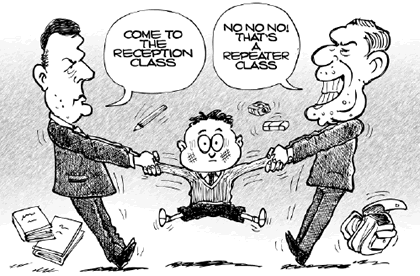
| EDITORIAL | Sunday, 24 February 2008 Let’s engage  This election has been conspicuous by its absence of a national electoral issue. Unlike previous elections, which were dominated by the fight for the restoration of democracy, or for European membership, no single issue seems to be dominating this particular campaign. The convergence of both political parties on many issues in an attempt to occupy the centre ground has led to a situation whereby the only real difference concerns form rather than content. Much common ground exists on previously divisive issues: for instance, privatisation, healthcare, the role of the private sector, the rolling back of the state, even EU membership itself, to mention but a few. As a result, the election risks boiling down to a question of which of the two party leaders one trusts more to look after the country’s affairs and to manage the economy. This newspaper has always expressed the hope that the election campaign would consist in a battle of ideas, where all the issues closest to people would be discussed dispassionately, allowing people to come to their own conclusions after engaging in an informed debate. Regrettably, no such debate has taken place. On the contrary, negative campaigning, scaremongering, accusations of lies, and the hurling of insults have been the order of the day. Take education, for instance. Among its electoral promises, Labour has proposed a “reception class” which would result in children attending primary school one year later than they do at present. It is a system used in many European countries, including the UK and Scandinavia… but the proposal is not above censure. For one thing, it seems to have been added to the manifesto at the eleventh hour, with little or no consultation with major stakeholders such as the Malta Union of Teachers. More worryingly, when interviewed by this newspaper, the Labour spokesman for education Carmelo Abela could not answer basic questions, such as: would the reception class result in students finishing school a year later? This lack of basic information has allowed the MLP’s opponents to spin the “reception” concept into that of a “repeaters’ class”. By so doing, all talk of educational reform – an important and much-needed debate in this country – has been reduced to the lowest levels of cheap political talk. Why not engage in a fully informed, no-holds-barred debate, and allow people to draw their own conclusions? Why must we always allow politics to degenerate into a Punch and Judy show? Equally scary is the health debate, which has simply fizzled out into both parties guaranteeing the maintenance of a free health system without a word on means testing, sustainability or the proper use of the limited financial resources available; the shortage of nurses and doctors, or even strategies on how to target waiting lists. This obsession to give services for free, independently of means, smacks of old socialism, evidencing the fact that the Mintoffian infrastructure is still cemented in the popular psyche. Many of the problems facing the people are conveniently being ignored. Has there been any talk of the deteriorating state of public transport? When is the last time you heard a politician speak about wage increases? Why all this talk on tax cuts, with little mention on how revenues will be recouped? Any mention of the looming economic global recession? The choice facing the electorate goes far beyond voting in favour of a party or a tribe; election results pave the future direction of a country and the difficult choices ahead. Now that we are members of the European Union, managing the European project is a top priority requiring a steady nerve and vision to take advantage of all the new opportunities open to us. The management of funds in order to upgrade local standards in the environmental, financial and social sphere are a one-time opportunity to modernise the country. This all requires a European mindset which is in synch with the European way of doing politics: clearly separating the roles of state and church; recognising the value of secularisation; recognising the regulation of co-habitation and other forms of lifestyles. The choice facing the electorate boils down to the trust people have in Lawrence gonzi’s “safe pair of hands” to manage the country, as opposed to Alfred Sant’s capacity to change and modernise the country. Ultimately only one of the two leaders will be entering Castile on the March 10. It’s the undecided voter, still numerically high in the opinion polls, who will tilt the balance one way or the other. The political destiny of the country is in the hands of the hitherto undecided voter. We believe an informed debate would have made the choice easier. Any comments?
|
MaltaToday News |
Copyright © MediaToday Co. Ltd, Vjal ir-Rihan, San Gwann SGN 9016, Malta, Europe
Managing editor Saviour Balzan | Tel. ++356 21382741 | Fax: ++356 21385075 | Email
Managing editor Saviour Balzan | Tel. ++356 21382741 | Fax: ++356 21385075 | Email